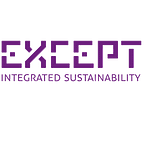A ride through (sustainable) space with industrial ecologist Jacob Verhaart
When Jacob Verhaart was little, his favorite word was “why?”. That condition never got better.
Jacob is Except’s Head of Research. An industrial ecologist and engineer, Jacob knows everything about energy and material flows, urban metabolism, impact and life cycle assessment, and the circular economy, with a particular love for building systems and sustainable building practices. He likes to get to know as much as there is to know about sustainability and translate that into concrete solutions for improving the world.
Jacob sees working in sustainability as an interesting technical challenge that is also a meaningful way to contribute to society. “You have to react and do something”, he states. “It’s the drive to do things better, not harm the planet, and make the world a more beautiful place. Maybe it’s basic but I like nature, I enjoy looking out of the window and seeing the birds fly”.
Jacob’s work with Except Integrated Sustainability exceeds the regular sustainability efforts. Combining various disciplines and embracing complexity lies at the heart of Except’s systems thinking approach to sustainability challenges. “You have to do things better since there’s no use of doing bad things less bad”, explains Jacob, paraphrasing Michael Braungart, German chemist, and a visionary environmentalist who, in Jacob’s words “practiced circularity before it was cool” with his book “Cradle to Cradle”.
“Finding an integrated solution means looking further and understanding that all things are interconnected. It started with the ‘Spaceship Earth’ idea. Most of the people that went to space looked at the Earth from a distance and realized that it’s such a small ball, floating in space, in such a hostile environment. There’s this picture by Michael Collins that contains all of humanity except for him. It’s a bit of a funny thought, although also a no-brainer, that there is no place where we can live as comfortably as on Earth.
Jacob’s space stories come as no surprise: he has a BSc. in Aerospace Engineering and an MSc. in Industrial Ecology. “Both industrial ecology and aerospace engineering deal with a similar type of complexity”, he responds when asked about this mix. “Industrial Ecology is the science of systemic, integrated sustainability. It tackles complex problems with lots of interconnected systems and looks at the problems and the solutions through a holistic lens. Aerospace engineering deals with a similar type of complexity, although mostly on a technical level. An airplane needs to be safe, fuel-efficient, comfortable, and economical, all the while defying gravity and providing comfort for the passengers, who would not be able to survive on the outside of the plane. This technical challenge has been undertaken for a century and has moved through several great transitions.”
Where does such a restless mind with far-reaching interests find himself at Except? “I enjoy working at Except because the atmosphere is quite relaxed, and at the same time, we do stuff that’s pretty cutting-edge, pretty new. I get the chance to constantly come up with fresh ideas and my contributions, as those of the rest of the team, are taken well. The nicest part are the SiD* sessions — we have some great, creative fun, and come up with solutions that reach beyond the ordinary”.
Symbiosis in Development (SiD) is Except’s self-developed framework for systemic sustainability, encompassing the circular economy, design, and systems thinking, and co-creation methods in a practical implementation. Find out more at thinksid.org.”
Written by Zuza Nazaruk, a sustainability journalist.
